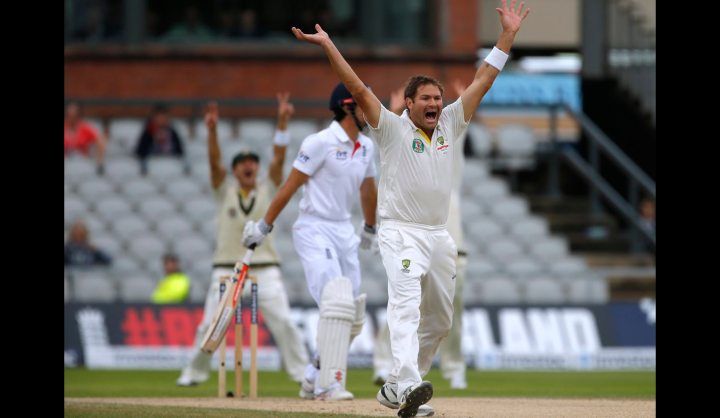Sport
Cricket: Oz has the more versatile attack – McGrath

On Monday, former Australian bowler Glen McGrath has said that Australia’s bowling attack is more versatile than England’s. Many will accuse the former quick of bias, but considering Australia’s seamers have outperformed England on slow decks, he might have a point. By. ANTOINETTE MULLER.
England have retained The Ashes, DRS has been discussed to death, there’s been a false report of silicone-based tape being used to hide edges and Monty Panesar has been fined for urinating on a bouncer in a club in Sussex. If that sounds like parody, it’s not. The Ashes headlines been dominated by controversies and quips which have very little to do with cricket. And yet, there has been some interesting cricket played.
What has been most interesting is the wickets England have been preparing. Most of the tracks have been slow, turning tracks instead of the usual pitches to aid the seam bowlers. There’s a simple reason for that: Australia are suspect against the spin and England have one of the best spinners in the world in their arsenal.
Graeme Swann has been the difference between the two teams. He tops the wicket-taking list with 19 sticks in three Tests with a tidy economy rate of 3.00. Australia’s frontline spinners do not even feature in the top 10.
Both Peter Siddle and Ryan Harris are in the top five, and both players have a lower average and a lower economy rate than James Anderson. All this despite England very much outscoring Australia in almost every match. Siddle and Harris have been very impressive. They have used the crease better than England and they’ve managed to extract something out of nothing, even in unfavourable conditions. Siddle has bowled more maidens than anyone else. He has been a sublime asset for Australia over the summer.
Former Australian pace ace Glenn McGrath believes that England’s bowlers have struggled for a Plan B.
“Obviously I’ve got huge regard for Anderson – and Broad and Bresnan are quality bowlers too – but as a trio they’re not too dissimilar. Anderson is obviously the standout. Bresnan is always going to work hard and Broad hits good areas. They are all fairly attacking bowlers, they like to take wickets but if Plan A isn’t working they don’t really have much to fall back on,” McGrath wrote in The Guardian.
“For Australia Peter Siddle has been the leader of the unit for a few years. You know what you’re going to get with him – he’s going to run in hard all day and hit the deck. He’s started to bowl a much fuller length in the last few years, which has come out of the work he has been doing with Craig McDermott. He bowls good areas, keeps it tight, really makes batsmen earn their runs and gets a little bit of swing when he does pitch it up.
“Ryan Harris is quicker and gets a bit more shape and then you’ve got the left-armer in Mitchell Starc. Shane Watson is different again. He’s kept it very tight, stopped the scoring and allowed the other bowlers to freshen up, to have a bit of a break and to come back without too much damage being done.”
But Australia’s bowlers are not without their weaknesses, and inconsistency troubled them at the start of the tour.
During the first Test at Trent Bridge, Australia’s bowlers conceded four wides and two no balls in the first innings. England didn’t concede any.
The trend continued into the second innings and into the Lord’s Test, but the Australian pack finally found their rhythm in Manchester. There they conceded just a wide and a no ball across the two innings, while England’s bowlers overstepped the line twice and spilled it wide five times.
On a relatively flat deck, James Anderson finished wicketless in the first innings with his worst figures ever in a Test match and Stuart Broad has looked out of sorts all tour. He’s taken just six wickets at an average of 52.00. There is a harsh demand placed on Anderson who needs to spearhead the attack and lead from the front. If Anderson isn’t on point, it seems nobody else is either.
England have Graham Onions and Chris Tremlett waiting in the wings to potentially give Anderson a rest for the next two Tests. That shifts pressure onto Stuart Broad to lead the attack and help the “inexperienced” players blend into the Test side without the nagging demand for taking wickets on their shoulders.
England still hold the Ashes Aces, largely due to Australia’s ineptitude. The tourists’ batting has been brutal on their bowlers, with the bowlers hardly getting time to rest between innings. That workload pressure is no good for anybody’s health and Australia must be wondering when Ryan Harris’ next injury will come around.
With two Tests left and a return series later this year, it is pivotal for the Australian batsmen to pull their weight. Not just to give themselves a chance to compete, but for the wellbeing of their bowlers. DM
Photo: Australia’s Ryan Harris (R) successfully appeals for the wicket of England’s Alastair Cook (L) on the final day of the third Ashes test match at Old Trafford cricket ground in Manchester, northern England August 5, 2013. REUTERS/Phil Noble




















 Become an Insider
Become an Insider